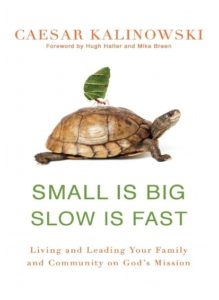
Small Is Big, Slow Is Fast: Living and Leading Your Family and Community on God’s Mission
by Caesar Kalinowski
This excellent book highlights some of the teachings of Jesus that are counter-intuitive to many church planters and pastors. It contains principles, examples, and practical pointers for those who are interested in pursuing a life on mission in community with other followers of Christ. Even though the author is heartily pro-church, his missional journey began when he, as a megachurch pastor, became disenchanted with “doing church” as many of us have practiced it. He wrote:
After a few years, I began to chafe a bit, wondering if Jesus had died on the cross so that a few chosen people in a church service could “do” the ministry while pretty much everyone else just sat there, passively and silently watching. Was this what God had in mind? Was this the hope we had for growth and maturity as a follower of Jesus? Was the highest goal for most of my friends to become an usher in the church building . . .? [Kalinowski, Caesar (2014-10-28). Small Is Big, Slow Is Fast: Living and Leading Your Family and Community on God’s Mission (p. 25). Zondervan. Kindle Edition.]
He decided to adopt a different approach to church, through which he has learned numerous ways to help her become more effective in its mission to preach the gospel and make disciples.
Moving Forward
Let’s first establish a well-known principle that we usually cannot do things better until we properly assess where we have been and where we are now. It is important for us to gratefully acknowledge all the positives about the church as well as critique its deficiencies, with a heart to help her move forward. In fact, it often takes somewhat of an outsider to do this because we become culturally blind to many of the church’s problems and challenges. Our quest to find a better way of doing church almost always starts with a gnawing sense that something is wrong, coupled with a hunger for something better.
Caesar wrote:
I wondered what it would be like to live in real community with others, not just saying hello to them once a week and shaking hands. I wondered what it would look like to intentionally disciple each other to greater faith in Jesus, living together as God’s missionary family, here in my own neighborhood. There was one huge problem in all of this. I had zero not-yet-believing friends. In fact, I hardly even knew my neighbors. I was too darn busy pulling off all the programs that went on throughout the week (after week after week) at the church building. (p. 26)
The author observes:
What I learned was that the way the disciples of Jesus lived was not only in stark contrast to his own culture, but was upside down compared to everything else at that time, both Jewish and pagan. A pattern of teaching and living began to emerge that was profound, yet much simpler than I had seen or experienced in my own life. There was an “all in” nature to life in the kingdom of God, but the process for getting in and living out this life was somehow . . . uncomplicated, less pressured and mustered up, less programmed. (pp. 26-27)
Kalinowski ended up pursuing the “missional” model of being the church. Here he defines the concept:
Missional carries with it the idea that our lives should be radically oriented around the mission of Jesus, the same mission that he sent his disciples to replicate — making disciples who make disciples, as a family of missionaries, together. (p. 27)
The concept is easy to grasp and usually generates some positive response; that is, until we actually get down to trying to incorporate it into our daily lives.
…not everyone who was a Christian was willing to jump right into this new “missional lifestyle” with us. They all agreed that this was biblical, but their existing preconceptions of Christianity, the church, and their own priorities acted as a huge gravitational pull backward, away from a life where the priority and focus was living on mission with God. Apparently we still had a lot to learn about how best to implement Jesus’ methods of making disciples. (p. 28)
Small Is Big, Slow Is Fast
What the author shares in the remainder of the book are principles that can help those who pursue the missional type of lifestyle and church.
The promise is also clear. After the good news of the kingdom takes root and changes your own heart, Jesus promises it will expand outward to include others. The seemingly small first steps you take to cultivate growth in your own life will grow over time and have a larger effect on others. We are not called to build elaborate, structured programs and systems and then expect lots of people to come on in and fill them up for us. Instead, we are to plant small (gospel) seeds that will eventually grow into changed lives, changed families, and changed communities. Small is big. That’s the first kingdom principle that Jesus taught. But it wasn’t the only one. Continuing with his disciples, Jesus taught them another kingdom code: slow is fast… The pattern: Like yeast, a catalyst for change and growth, the gospel begins to affect our lives slowly at first, igniting a change within us that influences every aspect of our existence. (p. 30)
Multiplication Wins
The next principle Caesar introduces is that healthy life forms reproduce and multiply, which is God’s goal for the church. It is my belief that, if we do the hard work of laying down our lives and living for the kingdom of God, multiplication will follow. But this is no small task. The sin nature and our consumer culture is so ingrained that we generally resist what it takes to be truly missional, and easily slide back into traditional ways of thinking and acting.
A life lived on mission with God, where your focus and priorities are reoriented around making disciples who make disciples, does not happen like flipping on a light switch and suddenly become a reality in your day-to-day experience… And just as we saw with Jesus and his followers, you will need to start small, go slowly, and learn to trust God himself to guide you. (pp. 38-39)
Dealing with Self-Centered Materialism
The first thing we must confront in ourselves is our sinful preoccupation with our own lives, comforts, and priorities. Missional living is an arch-enemy to self, since it puts God and his priorities first, which mainly involves pursuing his kingdom and lovingly serving our neighbors.
…if the worldly stuff still looks so good to us that it’s on the same list as Jesus, on the same shelf of priority in our hearts, then we will never be of much use in doing the work of his kingdom. Ouch! (p. 46)
Gospel Motivation
The next chapter is about the proper motivation for being a disciple who makes disciples. The author explains why guilt and a works-based approach to motivating people will never work. Instead he suggests that followers of Christ need to understand the bigger picture – the restoration of all things.
The restoration of all things has one goal — that God would be glorified! Discipleship is the only mission that Jesus gave his church. It is how the gospel goes out and multiplies and accomplishes the restoration of all things. It is the power of the gospel that sets us free and saves us. It is the purpose of the gospel that then sends us out to make more disciples of Jesus who now live in light of the same good news. The gospel is not just about my individual happiness or God’s plan for my life. It is about God’s plan for the world. (pp. 63-64)
Kalinowski adds that discipleship is the process of moving people from unbelief to faith in Christ in every area of life. We are all on this journey of faith.
Often there is a large gap between what we say we believe in our head and what we truly believe in our heart. I call this our Head-Heart Distortion. The process of closing the gap between what we know in our head and what we believe in our heart is called “sanctification.” Sanctification is what discipleship is all about. I often say it this way: “Discipleship is the process of moving from unbelief to belief, concerning what is true of God, and now true of us, in every area of life.” (p. 64).
The Reason to Get Involved
One of the big obstacles that missional people must overcome is the tendency to hang out exclusively with other followers of Christ. Jesus left the comfort and bliss of heaven to join us here on this sin-tormented planet. The least we can do is make it our goal to hang out with those who need him, not just with those who are already in the family of God.
And as for the idea that we should avoid people to remain holy — come on! Jesus was the holiest person who ever walked on this planet. In fact, his holiness — the way he perfectly imaged the character and nature of God — is what led him to hang out with people whom the religious establishment had declared unclean. Our ongoing involvement and relationship with others, especially those on the margins, begins when we profoundly grasp God’s grace. Our selfish and fearful instincts are to keep our distance. But Jesus let people like that kiss his feet. He’s the friend of riffraff, traitors, the unrespectable, drunks, druggies, prostitutes, the mentally ill, the broken, and the needy — people whose lives are a mess. He ate with them, hung out with them, and invited them on a journey. (pp. 77-78)
Once the author shows the need for being intentional in our efforts to connect with those who do not yet know Christ, he uses the remainder of the chapter to give some very helpful suggestions and tips on how to be effective at this.
What Next?
The next point the author makes is that it is necessary to intentionally invite others into our missional communities.
Our goal is not to have a group or program that we call our “missional community.” Our co-mission is to lovingly invite the people God has purposely brought into our lives to join us in community as together we share the story of the gospel, make disciples, and learn to live as an extended family following Jesus together. That’s what starting a missional community is really all about. This is not a fad or the latest church growth technique or a new name for small groups or cell groups. It is rediscovering the church as oikos — an extended family on mission — where everyone is important and has a vital role to play. I like to think of it this way: Joining God on his mission is joining his family. It’s going with our Dad and Brother Jesus, guided and empowered by the Holy Spirit, out into the world to do the family business. (pp. 95-96)
Caesar explains that missional groups must embrace being organized and organic. In other words, we need planned and unplanned activities, just as a biological family does. If we leave out one or the other, community life will suffer.
He makes another great point that missional communities ideally should live in close proximity to foster more opportunities to do life together; otherwise, we easily drift into being small groups who are not really living the missional life.
…an MC that is made up of people who do not live relatively close to one another will have a very hard time really making disciples and developing others to do the same. Their best intentions usually dissolve into a weekly meeting that they call their “missional community,” and it is nothing more than an old-school “small group” with new language and higher hopes. So when it comes to building a family on mission from a network or neighborhood, I would suggest that you shoot for those closest to you and trust God for growth and multiplication as your collective relational network expands. (p. 107)
At LifeNet, we are still challenged in this area. Eventually my hope is to have true neighborhood-based groups, which get together regularly and impact the community in a positive way. Currently, we are somewhat scattered, which makes it more difficult to be spontaneous. We also wrestle with the American phenomenon of extreme busyness. Our schedules tend to be packed.
Caesar makes a good point that such regular interactions with the missional community are essential to genuine discipleship.
But I want to stress that since the goal of discipleship is to see every part of our lives come in line with the truth of the gospel, being and living more and more like Jesus, we have to be sure that we are actually in the normal stuff of everyday life with the people we are discipling. It is one thing to be a witness to someone. It is another thing to disciple them in all of life. (pp. 107-108)
Remember, this all starts with your family. You will never lead others further or disciple them “better” than you live this out in your own household. This can be challenging for us to get our heads and hearts around, because many of us have built our Christian lives around a Sunday church service or a midweek small group time and an occasional service project. But if you treat discipleship and mission like a weekly meeting or events on a schedule, that’s all they will be. And unfortunately, your relationship with God will mirror what you live and practice. Life with God will be nothing more than a scheduled event, a few times a week. (p. 109)
Discipleship takes place amid our ordinary day to day activities. If we include others in these activities, it gives us the opportunity to speak into their lives and demonstrate kingdom living. Discipleship can be compared to re-parenting people according to the truth of who they have become through faith in Christ. They are now beloved children of God who need to learn to think accordingly.
…there are three main components that must be taught, lived out, modeled, reminded, and retaught over and over: gospel, community, and mission. These three elements are the foundation, the core we return to, that consistently helps disciples connect to God in every area of their lives. We need to help people increase in the rhythms of living out the gospel together in community, living more and more like a family. And it takes consistent growth in the mission of pursuing people who are not yet part of the family and seeking those God has specifically called us to make disciples of. (p. 120)
Discipleship happens in a gospel-centered community that is living life together on mission. This is because a community that does not have the gospel as its center and purpose is just another social group or club. And it’s when we really live out Jesus’ mission that our true need for him and the gospel is revealed in greater ways. The Spirit uses these experiences and the various parts of the body in our community to help us conform to Christ. This is how true discipleship happens — not in a classroom, but in a family of missionary servants. (p. 122)
I have learned that the secret to increasingly living our lives together on God’s mission is to move away from seeing discipleship as something that needs to be tacked onto an already busy schedule, toward seeing all the normal stuff of life as full of opportunity for discipleship and growth in the gospel. This is not a call to life plus mission; rather, it is a call to life on mission. (p. 124)
Leadership Development
The author uses the next chapter to communicate the necessity of identifying and developing leaders. New communities cannot be successfully launched without new leaders.
But if all of our efforts never lead to new leaders being sent out on mission to start new extended families (oikos), then we just become another self-focused group that never grows. Or perhaps we become intoxicated with our group just getting larger and larger under our own leadership and direct supervision. Remember, healthy things always grow and reproduce themselves. If your missional community grows larger but never multiplies, it is not healthy. In my earliest experiences with starting MCs and planting churches, I learned that I had to keep my eye on the prize of ongoing leadership development. (p. 131)
Not everyone is willing or able to lead. Part of our task is to identify those who are and develop them, teaching them how to lead, giving them leadership opportunities, and coaching their growth.
Conclusion
Kalinowski offers some practical guides in the Appendix, which may or may not be useful, but are worth a look. What I came away with after reading this excellent work is that missional living is mostly about fully committing to community life in pursuit of fulfilling the Great Commission. It is one thing to individually commit to and model such living, and quite another to bring an entire group along for the ride. The need to spend lots of time together in planned and unplanned activities requires a wholesale lifestyle change for most people. John Maxwell once said that groups cease to grow when they are unwilling to pay the price required for that growth. May the Lord help us to embrace New Covenant missional living in the place of our isolation and “comfortable Christianity.” It will take the Spirit’s help for this to happen, but we must be willing and obedient. Help us, Lord!



